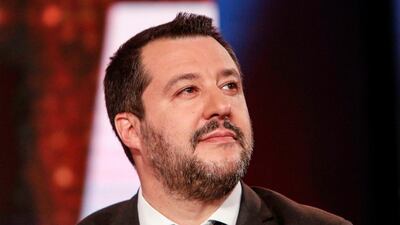Full-scale rows that abandon all the rules of political protocol have been, up until recently, exceptions that proved the general diplomatic rule.
One such example was a famous outburst by Saddam Hussein’s second-in-command, Izzat Ibrahim Al Douri, at a meeting of the Organisation of the Islamic Conference in March 2003.
Mr Al Douri told Kuwait’s Sheikh Mohammed Sabah Al Salem Al Sabah to “Shut up, you monkey.” Not content with that display of petulance, he went on to add: "Curses be upon your moustache, you traitor.”
That exchange was emblematic of the bitterness between the two nations and came as the OIC convened to seek a unified stance against a US-led war on Iraq.
Tensions were high and much was at stake, as subsequent events proved.
Debate still rages about Nikita Khrushchev’s alleged shoe-banging at the United Nations in New York in 1960, another rare example of open discord in response to a speech in which the Philippines delegate, Lorenzo Sumulong, criticised Eastern European communism.
In the 19th century, duels between statesmen were relatively commonplace. It is said that this fashion began to fade after 1865, when Otto von Bismarck, the Prussian leader, declined a challenge to eat contaminated sausages that was issued during an argument about food safety.
Since then, political debate has remained mostly civilised. However, rudeness is steadily creeping back into international affairs, and while the posturing is verbal, the stakes are growing higher.
Take the pointed exchanges between Italy and France that have occurred in recent weeks. They arose when one of Italy’s two deputy prime ministers – the Five Star Movement’s Luigi Di Maio – accused France of holding Africa in a colonial embrace and using the CFA, or West African franc currency, as a tool to keep the continent’s people in poverty.
The French foreign ministry summoned the Italian envoy for a dressing down, but Mr Di Maio's fellow deputy prime minister – Matteo Salvini of the far-right League party – then made matters worse by saying that France was not interested in creating stability in Libya because its energy interests there rivalled those of Italy, and then called Emmanuel Macron a "terrible president".
In June last year, Mr Macron compared the left and right Italian populist coalition to an outbreak of leprosy spreading across Europe. That led Mr Salvini to describe Mr Macron as all talk and no action.
France has also been irritated by Mr Salvini’s backing of the yellow vest protests against Mr Macron’s government. It has warned Mr Salvini to put his own house in order before condemning others.
Italy was also in German crosshairs last week when Berlin withdrew its navy from the EU maritime migration mission, claiming the Italian command centre was deliberately sending its ships in the wrong direction.
Discord is reaching the most unlikely settings. At a ceremony to mark the renewal of the French-German military partnership, Donald Tusk, the president of the European Council, criticised the direction of policy openly. “Let me put it very bluntly,” he said. “Today Europe needs a clear signal from Paris and Berlin that enhanced co-operation in smaller formats is not an alternative to the co-operation of Europe as a whole.”
Yet Mr Tusk himself is no stranger to rancour. As Europe took a hard line on British efforts to negotiate with the EU over Brexit, he published an Instagram post on the UK’s hopes for a deal that would both allow it to have its cake (access to EU markets) and eat it (leave the obligations of political union).
He also offered a cherry cake to Theresa May, the British prime minister – a double insult, given that Mrs May is diabetic.
He has also used Twitter to attack Donald Trump for pulling out of the Iran nuclear deal and making negative comments about European defence spending. At one point, he wrote: “With friends like that, who needs enemies.”
Mr Trump, meanwhile, is an expert in online vitriol and sees no reason for politeness. Late last year, he attacked Mrs May’s deal with the EU for Brexit, claiming that her approach would destroy hopes for a trade agreement with the US.
Most notoriously, he took to Twitter to call Kim Jong-un, the North Korean leader, "Little Rocket Man". Perversely, this tactic resulted in the pair shaking hands, wreathed in smiles, at an unprecedented summit in Singapore last June.
Last week, however, Mike Pence, Mr Trump's vice-president, appeared to call for a revolution in Venezuela during a video message, in which he told the "good people" of the nation to "reclaim [their] birthright of Libertad".
It is easy to consider some of this trash talk as an increasing honesty in global politics. However, Bismarck knew the dangers of putting the gory workings of diplomacy on public display. It was far better, he said, to at least maintain a facade of civility.

